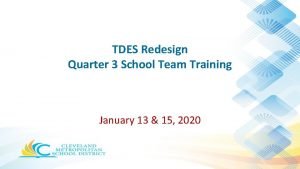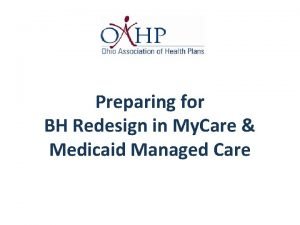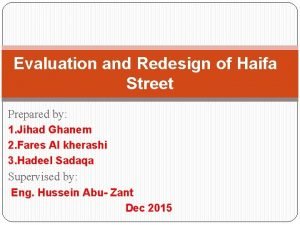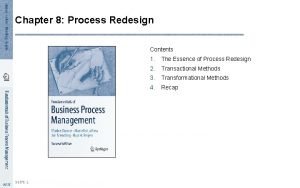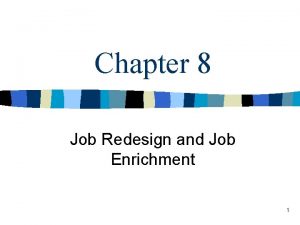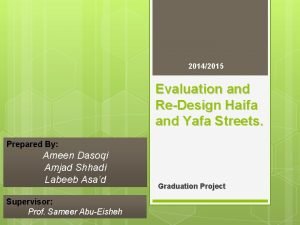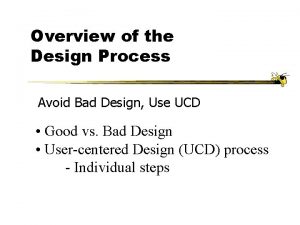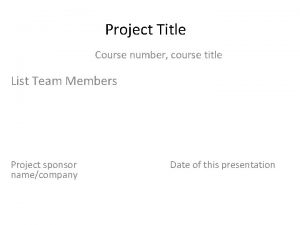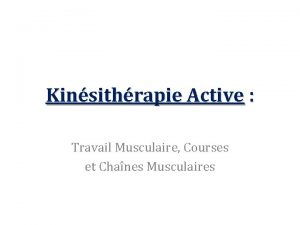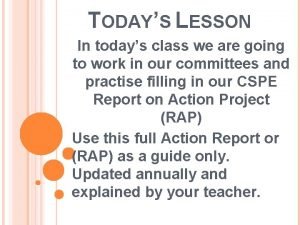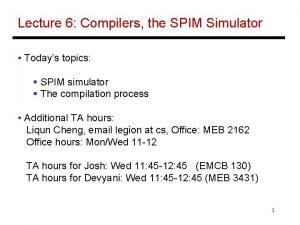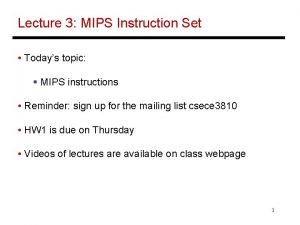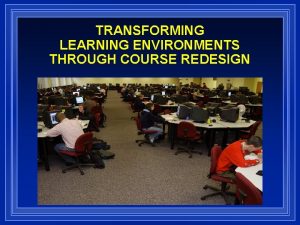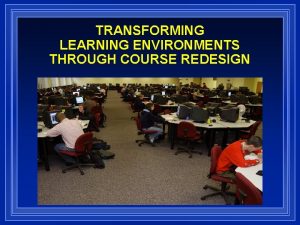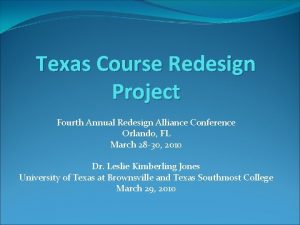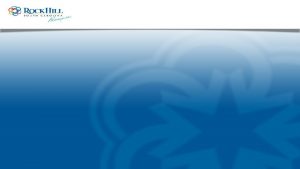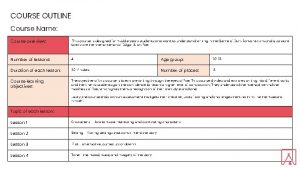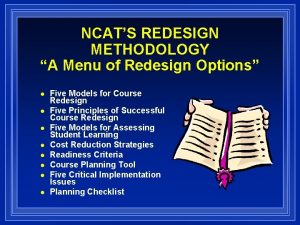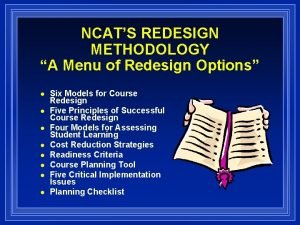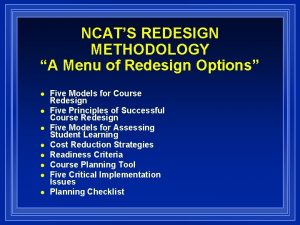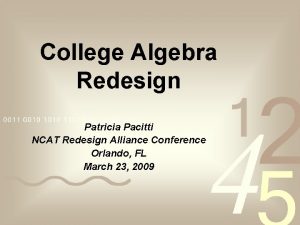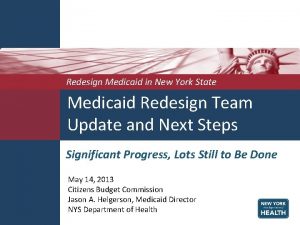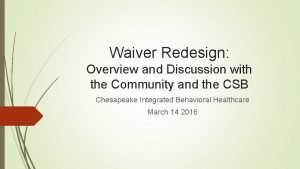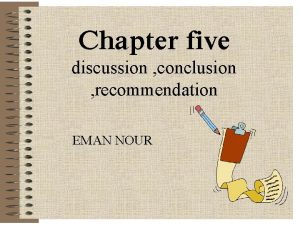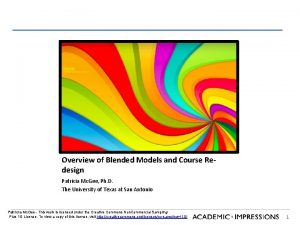TODAYS DISCUSSION Overview of Course Redesign Five Principles



































- Slides: 35

TODAY’S DISCUSSION § § § Overview of Course Redesign Five Principles of Successful Redesign Measuring Outcomes of Redesign § § Assessment Approaches Cost Reduction Strategies NCAT Resources Next Steps

Section 61. 0763 of the Texas Education Code requires the Board to “implement a project under which institutions of higher education selected by the Board will review and revise entry-level lower division academic courses. . . to improve student learning and reduce the cost of course delivery through the use of information technology. ”

“The initiative will be guided by existing course redesign models and the work done through the National Center for Academic Transformation. ” “In the event that the Board secures a contract with NCAT, institutions will be given the option of participating in the NCAT process. ”

OPTION A n THECB will partner with NCAT to work with selected projects to – – – help you refine your initial proposals develop solid plans that will be successful, and share your course redesign successes nationally

OPTION B n n In keeping with the intent of House Bill #1 and the desire to provide consistent results across all projects to provide information that others in Texas can use, we need consistent reporting of student learning outcomes and instructional costs. Because NCAT has developed and tested a number of reporting approaches to measure these two components, we have asked NCAT to work with each of you to be sure that you understand what is needed and how to obtain and report the data.

Established in 1999 as a university Center at RPI funded by the Pew Charitable Trusts n Became an independent non-profit organization in 2003 n Mission: help colleges and universities learn how to use technology to improve student learning outcomes and reduce their instructional costs n

SPELLINGS COMMISSION n n n We recommend that America’s colleges and universities embrace a culture of continuous innovation and quality improvement. Effective use of information technology can improve student learning, reduce instructional costs, and meet critical workforce needs. We urge states and institutions to establish course redesign programs using technologybased, learner-centered principles drawing upon the innovative work already being done by organizations such as the National Center for Academic Transformation.

WHAT DOES NCAT MEAN BY COURSE REDESIGN? Course redesign is the process of redesigning whole courses (rather than individual classes or sections) to achieve better learning outcomes at a lower cost by taking advantage of the capabilities of information technology.

PROGRAM IN COURSE REDESIGN Challenge colleges and universities to redesign their approaches to instruction using technology to achieve quality enhancements as well as cost savings. 50, 000 students 30 projects

QUANTITATIVE (13) n Mathematics – – – – Iowa State University Northern Arizona University Rio Salado College Riverside CC University of Alabama University of Idaho Virginia Tech n Statistics – – n Carnegie Mellon University Ohio State University Penn State U of Illinois-Urbana Champaign Computer Programming – – Drexel University at Buffalo

SCIENCE (5) SOCIAL SCIENCE (6) n Biology – – n Fairfield University of Massachusetts – University of Iowa U of Wisconsin. Madison Astronomy – U of Colorado. Boulder Psychology – – – Chemistry – n n – n Sociology – n Cal Poly Pomona University of Dayton University of New Mexico U of Southern Maine IUPUI American Government – U of Central Florida

HUMANITIES (6) n English Composition – – n Spanish – – n Portland State University of Tennessee Fine Arts – n Brigham Young University Tallahassee CC Florida Gulf Coast University World Literature – University of Southern Mississippi

IMPROVED LEARNING OUTCOMES n n n n n Penn State - 68% on a content-knowledge test vs. 60% UB - 56% earned A- or higher vs. 37% CMU - scores on skill/concept tests increased by 22. 8% Fairfield – 88% on concept retention vs. 79% U of Idaho – 30% earned A’s vs. 20% UMass – 73% on tougher exams vs. 61% FGCU - 85% on exams vs. 72%; 75% A’s and B’s vs. 31% USM - scored a full point higher on writing assessments IUPUI, RCC, UCF, U of S Maine, Drexel and U of Ala significant improvements in understanding content 25 of 30 have shown improvement; 5 have shown equal learning.

REDUCTION IN DFW RATES n n n n n U of Alabama – 60% to 40% Drexel – 51% to 38% Tallahassee CC – 46% to 25% Rio CC – 41% to 32% IUPUI – 39% to 25% UNM – 39% to 23% U of S Maine – 28% to 19% U of Iowa – 25% to 13% Penn State – 12% to 9. 8% 24 measured; 18 showed improvement.

COST SAVINGS RESULTS Redesigned courses reduce costs by 37% on average, with a range of 15% to 77%. n Collectively, the 30 courses saved about $3 million annually. n

WHAT HAPPENS TO THE SAVINGS? n n n Stay in department for continuous course improvement and/or redesign of others Provide a greater range of offerings at upper division or graduate level Accommodate greater numbers of students with same resources Stay in department to reduce teaching load and provide more time for research Redesign similar courses Miscellaneous – Offer distance sections – Reduce rental expenditures – Improve training of part-time faculty

TAKING COURSE REDESIGN TO SCALE Lumina Study: Underserved Students n The Roadmap to Redesign (R 2 R) n Programs with Systems and States n Colleagues Committed to Redesign (C 2 R) n

PROGRAM IN COURSE REDESIGN VS. THE ROADMAP TO REDESIGN Another “Proof of Concept”

STREAMLINED REDESIGN METHODOLOGY “A Menu of Redesign Options” n n n n n Readiness Criteria Five Principles of Successful Course Redesign Five Models for Assessing Student Learning Cost Reduction Strategies Course Planning Tool Course Structure Form Five Critical Implementation Issues Planning Checklist

R 2 R COMPLETERS n n n Calhoun CC: Statistics Chattanooga STCC: Psychology Eastern Washington U: Psychology Georgia State U: Precalculus Louisiana State U: Precalculus Texas Tech: Spanish UNC-Greensboro: Precalculus U of Missouri-St. Louis: Precalculus U of Alabama: Spanish UNC-Chapel Hill: Precalculus UNC-Greensboro: Statistics Wayne State U: Precalculus

THE ROADMAP TO REDESIGN (R 2 R) 10 of 12 R 2 R projects improved learning; the other 2 showed equal learning. n 9 of 12 improved course completion rates. n All 12 reduced costs by 32% on average, with a range of 13% to 68%. n

TAKING COURSE REDESIGN TO SCALE Lumina Study: Underserved Students n The Roadmap to Redesign (R 2 R) n Programs with Systems and States n Colleagues Committed to Redesign (C 2 R) n

STATE AND SYSTEM-BASED PROGRAMS n Pilots – – n Hawaii Ohio South Dakota Minnesota Full-Scale – – – Arizona Maryland Mississippi SUNY Tennessee

STATE AND SYSTEM-BASED PROSPECTS n Committed – – n CUNY Indiana Serious interest – – – Connecticut Georgia Louisiana Oklahoma Virginia

TAKING COURSE REDESIGN TO SCALE Lumina Study: Underserved Students n The Roadmap to Redesign (R 2 R) n Programs with Systems and States n Colleagues Committed to Redesign (C 2 R) n

C 2 R PROGRAM PURPOSE “Colleagues Committed to Redesign (C 2 R) is a threeyear program conducted by NCAT. Its purpose is to support the efforts of colleges and universities to redesign their instructional approaches using technology to achieve improvements in student learning while reducing instructional costs. ” Outcome: Course Redesign Pilots

NEW NCAT FIPSE GRANT Sustaining Innovation: Course Redesign National Dissemination Project n n n n October 2006 – September 2009 Help build The Redesign Alliance Redesign Scholars Program 60 institutions committed to engage in redesign 12 disciplinary institutes Support collaboration among NCAT staff, Redesign Scholars and institutional teams Disseminate successful redesign strategies at annual national conference

C 2 R ROUND I PARTICIPANTS n n n n Boise State U: Accounting Cosumnes River College: Elem Algebra De. Paul U: College Algebra Hagerstown CC: College Algebra Harry S Truman College: College Algebra Indiana State U: Psychology Indiana U of PA: Biology Lorain County CC: Chemistry St. Cloud State U: Chemistry Truman State U: British Lit U of West Florida: Statistics UNC at Chapel Hill: Spanish Winston-Salem State U: Biology

n Program in Course Redesign (PCR) – n Roadmap to Redesign (R 2 R) – n 20 institutions Colleagues Committed to Redesign (C 2 R) – n 30 institutions 60 institutions State and System-based Programs – 80+ institutions

QUANTITATIVE n Mathematics – – – – – Developmental Math Pre-calculus Math College Algebra Discrete Math Introductory Algebra Elementary Algebra Beginning Algebra Intermediate Algebra Linear Algebra n Statistics – – n Business Statistics Introductory Statistics Elementary Statistics Economic Statistics Computing – – – Computer Programming Information Technology Concepts Computer Literacy Information Literacy Tools for the Information Age

n SCIENCE – – – Anatomy and Physiology Astronomy Biology Ethnobotany Chemistry Geology n SOCIAL SCIENCE – – – American Government Macro and Microeconomics Psychology Sociology Urban Affairs

n HUMANITIES – – – Developmental Reading Developmental Writing English Composition Communication Studies Understanding the Visual and Performing Arts History of Western Civilization Great Ideas in Western Music Spanish World Literature British Literature Women and Gender Studies n PROFESSIONAL – – – – Elementary Education: The Curriculum Engineering Technology Organizational Behavior Public Speaking Accounting Nursing

REDESIGN CHARACTERISTICS n n n n Redesign the whole course—not just a single class Emphasize active learning—greater student engagement with the material and with one another Rely heavily on readily available interactive software—used independently and in teams Mastery learning—not self-paced Increase on-demand, individualized assistance Automate only those course components that can benefit from automation—e. g. , homework, quizzes, exams Replace single mode instruction with differentiated personnel strategies What led to success?

FIVE REDESIGN MODELS n n n Supplemental – Add to the current structure and/or change the content Replacement – Blend face-toface with online activities Emporium – Move all classes to a lab setting Fully online – Conduct all (most) learning activities online Buffet – Mix and match according to student preferences

FOR MORE INFORMATION www. the. NCAT. org Full project plans n Monographs n Progress reports n Planning resources n Lessons Learned n Project contacts n
 Principles of business process reengineering
Principles of business process reengineering Aim of simple distillation
Aim of simple distillation Tdes school
Tdes school Getting organizational redesign right
Getting organizational redesign right Bh redesign
Bh redesign Job analysis information hierarchy
Job analysis information hierarchy Coast guard bpr
Coast guard bpr Redesign haifa
Redesign haifa 1/1 seite
1/1 seite Job enrichment example
Job enrichment example Design and redesign of work systems
Design and redesign of work systems Scina
Scina Redesign haifa
Redesign haifa Redesign bad honnef
Redesign bad honnef Job families examples
Job families examples Intranet redesign project plan
Intranet redesign project plan Technology allows for significant task redesign
Technology allows for significant task redesign What is the fundamental rethinking of business processes
What is the fundamental rethinking of business processes Soldier course vs sailor course
Soldier course vs sailor course Course number and title
Course number and title Course interne course externe
Course interne course externe And now with gleams of half-extinguished thought
And now with gleams of half-extinguished thought Five of five
Five of five Five elements and five senses
Five elements and five senses Macbeth
Macbeth Todays generations
Todays generations In todays class
In todays class Multiple choice comma quiz
Multiple choice comma quiz Todays worldld
Todays worldld Whats todays temperature
Whats todays temperature Todays globl
Todays globl Whats todays wordlw
Whats todays wordlw Chapter 13 marketing in today's world worksheet answers
Chapter 13 marketing in today's world worksheet answers Todays plan
Todays plan Todays sabbath lesson
Todays sabbath lesson Welcome for sabbath school
Welcome for sabbath school


